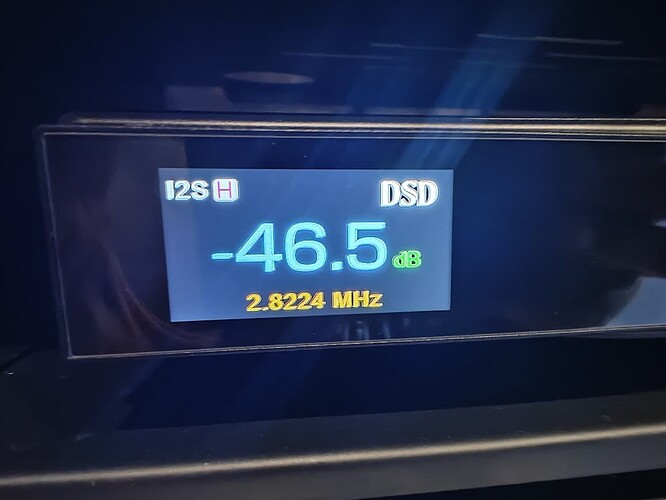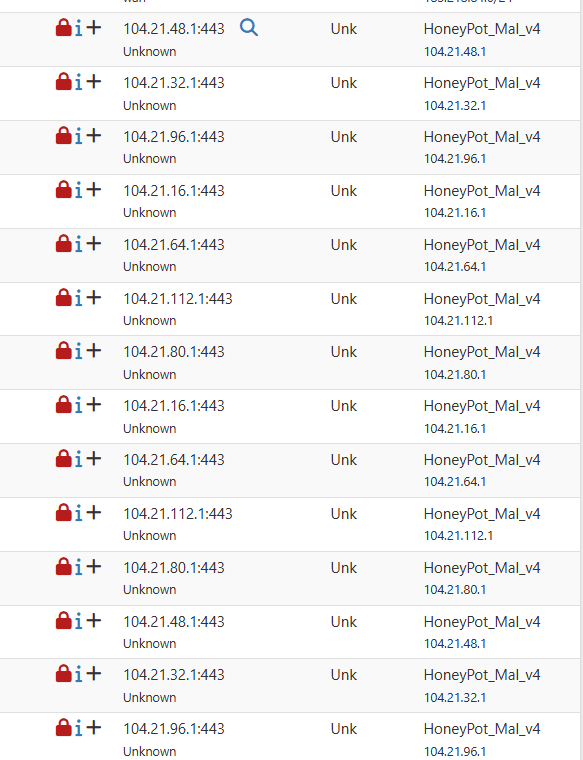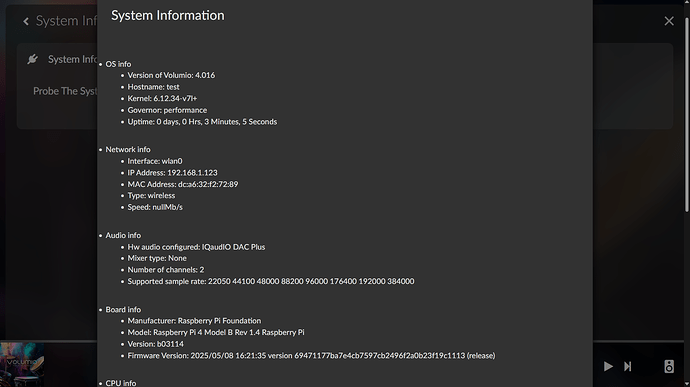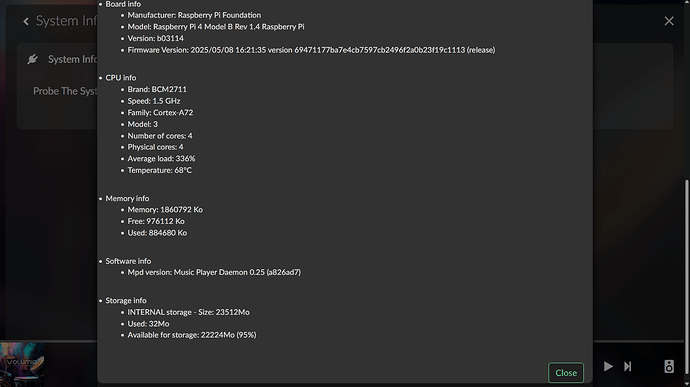Hi!
I installed Volumio 4 latest beta version, on PC. Every thing functions quite good, even youtube music, but not to HDMI.
I have two sound card, HDMI over my Marantz AVR surround receiver and Maverick Tubemagic DAC 2. For the record, I had turned of motherboard build in soundcard in bios settings.
Sound functions out from the Maverick, but not from HDMI. I got this message:
Volumio failed to open alsa (alsa). Failed to open ALSA device on “volumio”. No such file or directory.
I had tried to flip flop controls and al combinations of configuration. I have tested restart. Also tested adding;
options snd_hda_intel index=0
options snd-usb-audio index=5
in new file;
/etc/modprobe.d/sound.conf
(then a restart)
I have tested sound out from console, there is sound, tested by;
speaker-test -Dhw:0,3 -c 6
**This is my aplay -l;**
evi* List of PLAYBACK Hardware Devices ****
card 0: NVidia [HDA NVidia], device 3: HDMI 0 [marantz-AVR]
Subdevices: 1/1
Subdevice #0: subdevice #0
card 0: NVidia [HDA NVidia], device 7: HDMI 1 [HDMI 1]
Subdevices: 1/1
Subdevice #0: subdevice #0
card 0: NVidia [HDA NVidia], device 8: HDMI 2 [HDMI 2]
Subdevices: 1/1
Subdevice #0: subdevice #0
card 0: NVidia [HDA NVidia], device 9: HDMI 3 [HDMI 3]
Subdces: 1/1
Subdevice #0: subdevice #0
card 5: TE7022 [Maverick Audio TE7022], device 0: USB Audio [USB Audio]
Subdevices: 1/1
Subdevice #0: subdevice #0
card 5: TE7022 [Maverick Audio TE7022], device 1: USB Audio [USB Audio #1]
Subdevices: 1/1
Subdevice #0: subdevice #0
This is my aplay -L:
hw:CARD=NVidia,DEV=3
HDA NVidia, marantz-AVR
Direct hardware device without any conversions
hw:CARD=NVidia,DEV=7
HDA NVidia, HDMI 1
Direct hardware device without any conversions
hw:CARD=NVidia,DEV=8
HDA NVidia, HDMI 2
Direct hardware device without any conversions
hw:CARD=NVidia,DEV=9
HDA NVidia, HDMI 3
Direct hardware device without any conversions
plughw:CARD=NVidia,DEV=3
HDA NVidia, marantz-AVR
Hardware device with all software conversions
plughw:CARD=NVidia,DEV=7
HDA NVidia, HDMI 1
Hardware device with all software conversions
plughw:CARD=NVidia,DEV=8
HDA NVidia, HDMI 2
Hardware device with all software conversions
plughw:CARD=NVidia,DEV=9
HDA NVidia, HDMI 3
Hardware device with all software conversions
hdmi:CARD=NVidia,DEV=0
HDA NVidia, marantz-AVR
HDMI Audio Output
hdmi:CARD=NVidia,DEV=1
HDA NVidia, HDMI 1
HDMI Audio Output
hdmi:CARD=NVidia,DEV=2
HDA NVidia, HDMI 2
HDMI Audio Output
hdmi:CARD=NVidia,DEV=3
HDA NVidia, HDMI 3
HDMI Audio Output
dmix:CARD=NVidia,DEV=3
HDA NVidia, marantz-AVR
Direct sample mixing device
dmix:CARD=NVidia,DEV=7
HDA NVidia, HDMI 1
Direct sample mixing device
dmix:CARD=NVidia,DEV=8
HDA NVidia, HDMI 2
Direct sample mixing device
dmix:CARD=NVidia,DEV=9
HDA NVidia, HDMI 3
Direct sample mixing device
usbstream:CARD=NVidia
HDA NVidia
USB Stream Output
hw:CARD=TE7022,DEV=0
Maverick Audio TE7022, USB Audio
Direct hardware device without any conversions
hw:CARD=TE7022,DEV=1
Maverick Audio TE7022, USB Audio #1
Direct hardware device without any conversions
plughw:CARD=TE7022,DEV=0
Maverick Audio TE7022, USB Audio
Hardware device with all software conversions
plughw:CARD=TE7022,DEV=1
Maverick Audio TE7022, USB Audio #1
Hardware device with all software conversions
sysdefault:CARD=TE7022
Maverick Audio TE7022, USB Audio
Default Audio Device
front:CARD=TE7022,DEV=0
Maverick Audio TE7022, USB Audio
Front output / input
surround21:CARD=TE7022,DEV=0
Maverick Audio TE7022, USB Audio
2.1 Surround output to Front and Subwoofer speakers
surround40:CARD=TE7022,DEV=0
Maverick Audio TE7022, USB Audio
4.0 Surround output to Front and Rear speakers
surround41:CARD=TE7022,DEV=0
Maverick Audio TE7022, USB Audio
4.1 Surround output to Front, Rear and Subwoofer speakers
surround50:CARD=TE7022,DEV=0
Maverick Audio TE7022, USB Audio
5.0 Surround output to Front, Center and Rear speakers
surround51:CARD=TE7022,DEV=0
Maverick Audio TE7022, USB Audio
5.1 Surround output to Front, Center, Rear and Subwoofer speakers
surround71:CARD=TE7022,DEV=0
Maverick Audio TE7022, USB Audio
7.1 Surround output to Front, Center, Side, Rear and Woofer speakers
iec958:CARD=TE7022,DEV=0
Maverick Audio TE7022, USB Audio
IEC958 (S/PDIF) Digital Audio Output
iec958:CARD=TE7022,DEV=1
Maverick Audio TE7022, USB Audio #1
IEC958 (S/PDIF) Digital Audio Output
dmix:CARD=TE7022,DEV=0
Maverick Audio TE7022, USB Audio
Direct sample mixing device
dmix:CARD=TE7022,DEV=1
Maverick Audio TE7022, USB Audio #1
Direct sample mixing device
usbstream:CARD=TE7022
Maverick Audio TE7022
USB Stream Output
any help appreciated.




